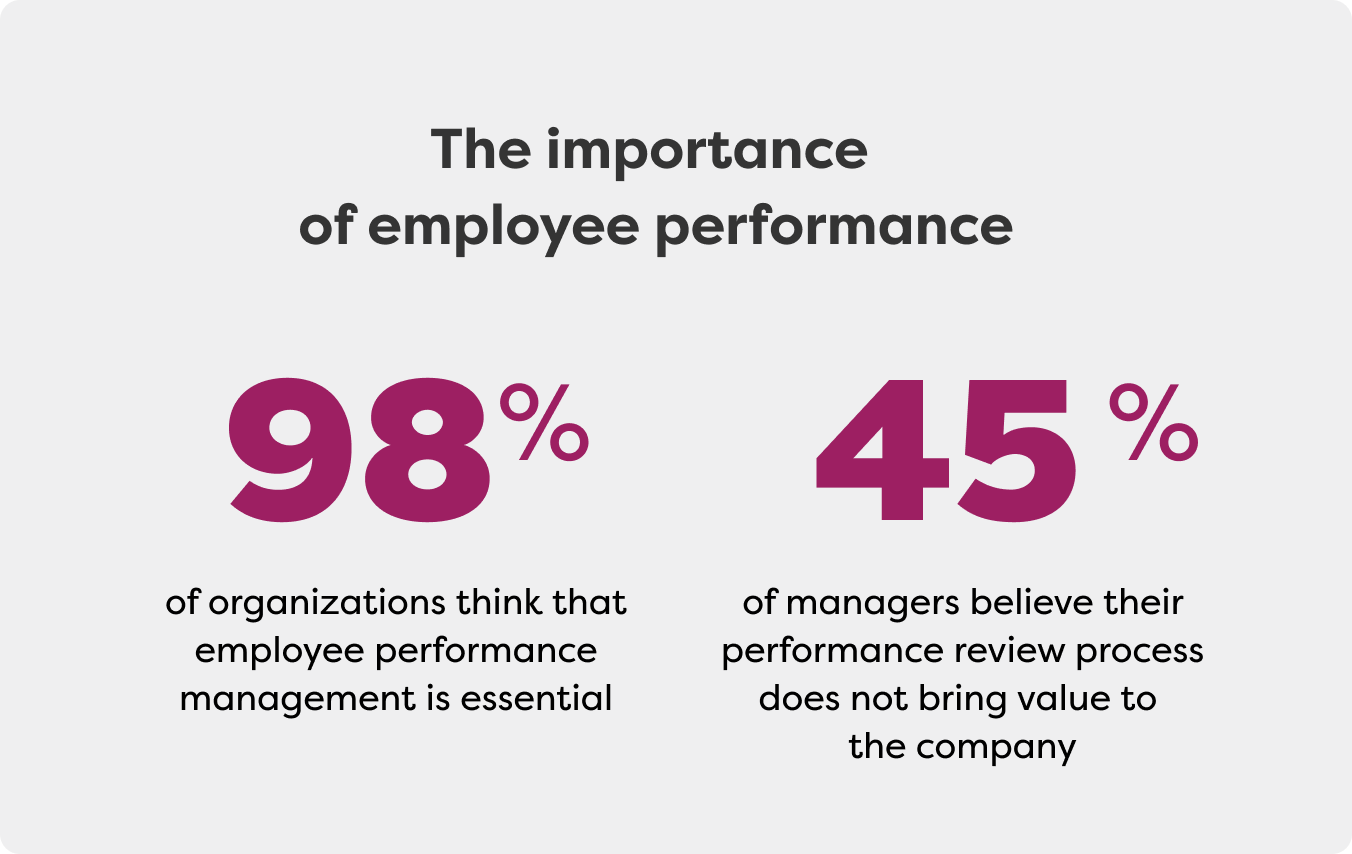HR statistics are great ways to improve people management and get some insights on the latest HR trends. They are particularly useful when it comes to employee performance management: monitoring performance is key to increase productivity and employee engagement and reach business goals. Without further ado, here are the top performance management statistics that will help you overcome performance management challenges this year!

Performance Appraisal Statistics
Effective performance management requires creating a culture of continuous feedback. However, statistics show that most companies don’t share regular feedback with their employees. Here are the most telling stats about performance appraisals:
1) 98% of organizations admit that performance management programs are crucial.
However, 45% of managers do not think their formal performance review process brings value to the company. This is an alarming contradiction that needs to be eliminated in your organization. Effectively preparing for your performance reviews is a great starting point to improve your performance management practices.
2) 69% of organizations only set up annual or bi-annual performance reviews.
Accordingly, 19% of workers only receive their feedback once a year. Knowing that constructive feedback needs to be timely and regular to be effective, these statistics reveal a major performance management issue that needs to be addressed.
3) 24% of employees would be ready to quit their jobs because of ineffective performance appraisals.
Imagine this: you are a high performer who is never identified or treated as such. You are likely to leave your job to find a position that would bring more challenges and responsibilities to the table. In the same way, regular or poor performers who are never supported or encouraged to improve their productivity will quickly become disengaged workers and quiet quitters.
4) 80% of employees would rather receive regular feedback than experience annual performance reviews.
This does not come as a surprise: annual performance appraisals can be sources of stress and discouragement, as employees often don’t know what to expect out of these evaluations. Accordingly, 51% of workers consider that their annual reviews are biased or inaccurate. Multiplying performance review meetings and sources of feedback (such as 360-degree feedback) helps overcome this issue.
5) Managers spend around 210 hours per year on performance management.
Even so, 90% of performance appraisals are ineffective. When dedicating high amounts of time to a process, you should ensure that they are beneficial to your organization. Therefore, modernizing performance reviews has become essential to save time and gain efficiency in human resources management.
6) 65% of employees want more clearly defined goals, tasks and responsibilities.
What better way to set these objectives and guidelines than during regular performance reviews? Employees also want to take part in business strategies and understand how their performance impacts business goals. Make sure to involve them in organizational success by setting up open communication and providing constructive feedback!
Performance and Recognition Statistics
Many studies have shown the long-term benefits of employee recognition, including how it encourages high performance. Here is what recognition statistics say:
7) 25% of employee departures are due to lack of recognition.
Unfortunately, only 12% of employees feel recognized at work. In the current context of talent war and labor shortage, voluntary departures need to be avoided at all costs. Performance reviews are the perfect opportunity to express your appreciation for your employees’ contributions, and remind them of the crucial part they play in team success.
8) 80% of Gen Y workers appreciate immediate recognition of their contributions.
Other generations of workers are very likely to want the same, but younger employees tend to be more assertive about their expectations. This means that regular, on-the-spot feedback is valued by your teams, and that managers should recognize performance on a daily basis.
9) 37% of employees say that if they received more recognition, they would be encouraged to increase their productivity.
Therefore, there is a clear link between employee appreciation and productivity. Considering that recognition can be as simple as saying thanks or showing that you care about your employees, it is a small effort that will definitely pay off in the long run!
10) Employees who feel appreciated are 2,7x more likely to be engaged.
By that point, you should be convinced of the benefits that employee recognition programs can bring to your company. Of course, these recognition efforts can only be carried out through comprehensive performance management and regular check-in meetings.
Performance and Employee Engagement Statistics
If you consider that performance has nothing to do with engagement, think again! Statistics show that here is a strong correlation between effective performance management and high employee engagement rates:
11) 50% of employees did not expect their performance review rating, and 87% experienced a negative surprise when they received their rating.
Following this negative surprise, these employees’ level of engagement dropped by 23%. Performance ratings should never be a surprise: poor and regular performers should be given guidance to grow and improve and appreciation for their work, and high performers should be praised and receive new challenges to overcome.
12) Employees who are involved in goal setting are 3,6 times more likely to be motivated.
Individual goals are one of the key points to address during performance reviews, and asking your employees what objectives they would like to pursue is important. Indeed, they are the best qualified to know what areas they could work on to better fulfill their role.
13) 71% of employees whose skills can be identified by their boss are more motivated and engaged.
Commenting on employees’ strengths and weaknesses during performance reviews will show that you care about their individual performance and that it matters to the company, thus increasing levels of engagement.
14) An average of 65% of employees are engaged when companies implement modern practices such as continuous feedback.
Meanwhile, only 32% of workers are engaged in other situations, showing that there is a strong link between effective performance management and employee motivation.
15) Companies that share consistent feedback report 14,9% lower turnover rates.
Understanding, recognizing and monitoring performance can go a long way towards giving meaning to work and retaining workers in the long run. No one wants to experience high turnover, so you should consider investing time and energy into improving your practices in that regard.
Statistics on Performance Management Software
These past few years, employee performance management software solutions have gained ground as tools that streamline evaluation and monitoring processes and help improve productivity. So, what are the key figures that you need to know?
16) 58% of companies use spreadsheets to track employee performance.
Spreadsheets have been proven to be lackluster tools to track and monitor performance. People management requires dedicated solutions to cover the entire employee lifecycle and improve employee experience!
17) 95% of managers are not satisfied with traditional performance management processes.
HR technology and performance management software are great ways to get rid of traditional, outdated processes and modernize your practices. For instance, they are adapted to remote workers’ contexts. Furthermore, they often provide various performance appraisal methods tailored to your needs.
18) 81% of managers are actively trying to improve their performance management practices.
Optimize performance management processes implies modernizing monitoring techniques, creating a healthy feedback culture, setting up open communication, and investing in appropriate HR technology.
Implementing effective employee performance management processes will definitely be at the forefront of HR strategies in the years to come. You can check out our complete performance management guide to optimize your practices!
Want to improve performance appraisals in your company?
Our performance management software is powerful and flexible!

